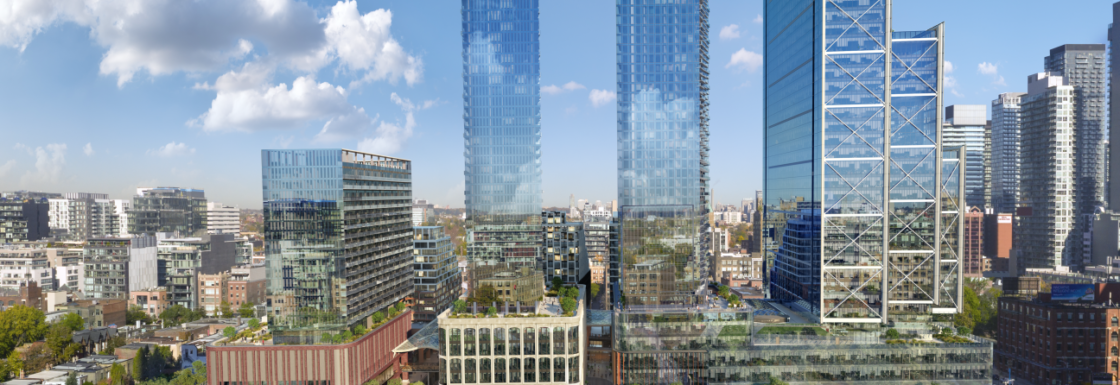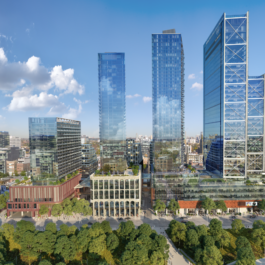RioCan Real Estate Investment Trust -and- Quinn & Partners: Sustainable CRE Development

Projects Sponsor
It’s difficult to over-emphasize the importance of developing urban properties sustainably. At present, real estate and construction industries continue to aggressively invest in urban assets. How they choose to manage and develop these assets will have a huge impact on how livable are cities will be, but also in an increasingly urbanized world, the climate, livability, of the entire planet.
As a developer, owner and operator of a significant real estate portfolio, RioCan Real Estate Investment Trust are among the first organization to recognize that they have a responsibility to consider the sustainability impacts of our activities along with opportunities to improve.
RioCan has accumulated a robust portfolio of income producing properties with significant redevelopment potential. While most Canadian real estate companies’ sustainability programs focus exclusively on building operations, very few take a proactive, sustainable approach to their development practices.
With this project, RioCan set out to do things differently. They recognized that stakeholder expectations for new buildings to be resource efficient and part of the community fabric are on the rise. At the same time, current and anticipated regulations around minimum performance, waste streams, greenhouse gas emissions, technology and affordable housing are creating an uncertain environment for developers.
RioCan’s goal was to integrate sustainability considerations throughout the development process, to position their assets favourably for the future and to ensure that the properties they are building retain their value over the long-term. Throughout the process, they considered ways to create value for their stakeholders and foster innovation by collaborating across their value chain and this led them to engage the services of expert sustainability consultants, Quinn & Partners.
Working with Quinn & Partners, RioCan Real Estate Investment Trust was able to develop an awareness of sustainable development best practices and—putting them at an advantage over competitors in the long term—-the anticipated regulatory environment. A sustainable development plan was created, with a focus on areas of the value chain and topics to address that are most material to the trust’s trajectory.
This work was led by Anushka Grant, Vice President of Sustainability and Asset Efficiency, in collaboration with approximately a dozen senior leaders from RioCan’s Development team, led by Andrew Duncan, Senior Vice President, Developments and their efforts achieved impressive, one would anticipate, trend-setting results and provide the firm with a road-map going forward into what can sometimes feel like a unchartable development future.
RioCan currently has 26.2 million sq.ft. of commercial real estate in their development pipeline. Their newly crafted Sustainable Development policy will result in significant environmental, social and governance improvements vis-à-vis business-as-usual practices in the years to come. These positive impacts will include, but are not limited to, systematically considering sustainability opportunities for each development project they undertake and communicating those realities and opportunities to project stakeholders.
Sustainability competencies will now be considered prior to engagement by RioCan because, thanks to Quinn & Partners, they now have the knowledge to include that criteria in all bidding processes, evaluations and contracts going forward.
The way we move about cities is changing rapidly, and our buildings need to start reflecting, or at least accommodating, that fact. To that end, alternative transportation including walking, cycling, public transit, and electric and autonomous vehicle will be factored in to RioCan’s decision making. Like just about all the other ideas they’re bringing into their planning process—consideration of occupant health and wellness, and accessibility features, climate resilience features, such as flood sensors, enhanced drainage and equipment protection measures, the inclusion of smart technology and digital infrastructure, sub-metering to support energy and water efficiency and water harvesting systems to meet irrigation and flushing demands, to name a few—this is a move that will help their business stay relevant and prosperous at the same time it helps fight climate change.
Work with partners to encourage employment of local labour, including apprentice workers will have a positive economic development impact and build skills in the community and procure materials that are locally-produced, non-toxic, recycled or have third party-sustainability certifications where feasible are smart business practices. As they say, “Location, location, location”.
Requiring that construction sites minimize nuisance to the community and meet or exceed all health and safety regulations builds goodwill and engaging in responsible demolition and waste management practices to maximize diversion from landfill, while limiting potable water consumption during construction process where feasible, are just good things to do. RioCan are leading the charge here. Their approach will result in significant impact, including performance improvements across environmental, social and governance metrics, for years to come. The potential to influence the major players in the Canadian commercial real estate development market, thereby extending the positive impact beyond their own organization, is significant and they want you to buy in. Consider this is an invitation to an open house of ideas. Please take off your shoes.

















